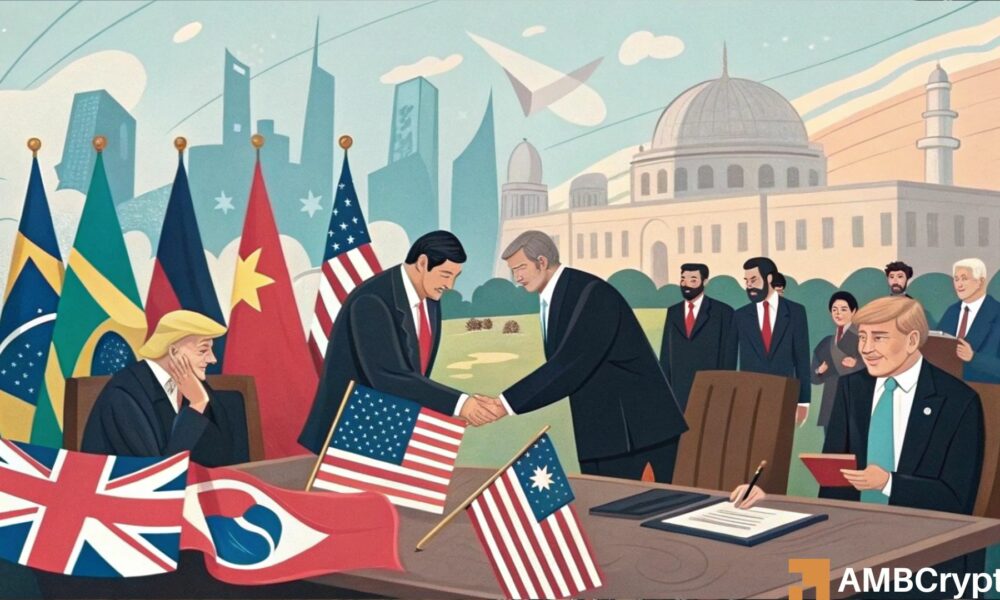The Impact of Trade Policies on Currency Markets and Cryptocurrency
Trade policies wield significant power in economic strategies, often transforming currency markets with their implementation. Tariffs, sanctions, and other regulatory measures can create ripples that impact not only traditional currencies but also the burgeoning world of cryptocurrencies. As global politics grow increasingly complex and digital currencies establish themselves, traditional economic tools are beginning to influence the cryptocurrency landscape in unprecedented ways.
Understanding Trade Policies and Currency Dynamics
At its core, trade policy is a game of supply and demand, directly influencing how goods and money navigate international borders. When a country imposes tariffs on imports, those goods become more expensive, leading to reduced foreign purchasing and a potential enhancement in the balance of trade. This shift may positively impact the domestic currency’s value. However, retaliatory tariffs from other nations can undermine these gains, often resulting in heightened volatility and investor uncertainty.
Additionally, sanctions complicate these dynamics. While sanctions may block exports or freeze foreign assets, leading to local currency depreciation, they can also inadvertently strengthen the domestic currency if imports are affected. The unpredictable nature of these trade disputes can introduce a sense of trepidation among foreign investors, which can further contribute to currency instability.
The Intersection of Trade Policies and Cryptocurrencies
The cryptocurrency market exists beyond the confines of traditional finance, introducing a new variable in the trade policy equation. For example, nations facing sanctions that cut them off from international banking systems may turn to cryptocurrencies as alternative means for international transactions. This can result in increased demand for cryptocurrencies like Bitcoin within those regions, offering individuals an avenue to protect their wealth against local currency depreciation.
Moreover, trade wars can drive individuals to swap local currencies for stablecoins or major cryptocurrencies, as they seek refuge from inflation and economic instability. Conversely, the broader economic repercussions of trade policies, such as inflation or declines in major economies, tend to sow fear across various asset classes, including cryptocurrencies. As tariffs press down on economic momentum, the repercussions can lead to downturns even in the digital asset space.
Historical Context of Trade Agreements and Future Implications for Cryptocurrencies
Historical trade agreements, particularly in the U.S., provide valuable insights into how trade policies could shape the future of cryptocurrencies. Agreements like NAFTA and its successor, the USMCA, significantly altered investment flows and currency values by modernizing rules governing digital trade, including currency policies. As a result, future trade agreements may increasingly incorporate regulations surrounding cryptocurrencies.
The ongoing U.S.-China trade conflict highlights this dynamic further. The rapid depreciation of the yuan following U.S. tariffs and the subsequent flight of capital into the U.S. dollar demonstrates the intricate relationship between trade policy and currency stability. As digitization continues to progress, the role of cryptocurrencies within these economic equations will likely evolve, offering citizens a potential refuge against volatile currencies.
Shifting Global Financial Landscape: Is the U.S. Dollar’s Dominance Waning?
As U.S. trade policies oscillate between open markets and protectionism, the strength of the dollar appears increasingly susceptible to challenges. While the dollar has maintained a stronghold in global foreign exchange reserves, its share has declined from over 70% to approximately 58% in recent years. This shift indicates a diversification trend, with central banks exploring alternative currencies.
Although strong trade agreements historically bolster the dollar, recent trends suggest that weaponizing the dollar through sanctions is driving countries like China and Russia to develop alternative financial systems. Cryptocurrencies could emerge as viable contenders in this evolving financial landscape, consequently empowering individuals and organizations to circumvent traditional banking limitations.
The Road Ahead: Regulatory Frameworks and the Future of Digital Assets
The complexity surrounding cryptocurrency regulation presents both challenges and opportunities. As trade agreements increasingly encompass digital currencies, establishing a consistent set of rules will be paramount for long-term market stability. Organizations such as the Financial Action Task Force (FATF) and the European Union are efforts to create regulatory frameworks for cryptocurrencies that could reshape their future.
Standardizing regulations could enhance institutional trust and encourage broader adoption of digital currencies. Furthermore, clear regulations would facilitate smoother cross-border transactions and could mitigate price volatility, improving the overall market for cryptocurrencies. As nations grapple with trade disputes, adaptability in both regulations and technological development will define the future of cryptocurrency.
Conclusion: A Complex Interplay of Trade Policies and Cryptocurrencies
In conclusion, the intricate connection between trade policies and cryptocurrencies is becoming more evident as both influence one another within an ever-evolving global economy. While traditional currencies feel the immediate impacts of tariffs and sanctions, cryptocurrencies occupy a unique position, serving both as a refuge for individuals losing faith in their national currencies and as a potential disruptor to the global financial order.
As nations increase their focus on creating robust regulatory environments for digital assets, the ongoing tug-of-war in trade relations could lead to significant transformations in the cryptocurrency ecosystem. With both challenges and opportunities on the horizon, the intersection of trade policies and cryptocurrencies will continue to shape the future of economic transactions and global finance.


